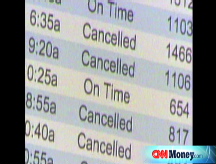Beating a battered airline industry
More than 3,100 cancellations are only the latest bad news for an industry that has recently withstood soaring fuel costs, an increase in delays, and public relations gaffes.
NEW YORK (CNNMoney.com) -- Cancelled flights for failed safety inspections have reduced air travel to a crawl for many passengers, but it is only the latest bad news in a series of woes for an already battered industry.
American Airlines (AMR, Fortune 500) canceled 900 more flights - 40% of its schedule -Thursday because the airline twice failed to meet an air-worthiness directive by the Federal Aviation Administration. That brings the total number of inspection-related cancellations for U.S. carriers to more than 3,100 in the past three weeks - with the potential of cancellations continuing into the summer, leading to multi-million dollar daily losses, according to industry analysts.
But grounded passengers are not the only thing hammering airlines recently. Rising fuel costs, long delays and public relations gaffes have also beaten up the industry.
"It's a very troubled time for the industry," said Air Travelers Association president David Stempler. "It leaves passengers in a very unsettled state."
Fuel costs
With crude oil hovering around $110 a barrel and the cost of jet fuel doubling since last year, airlines are struggling to keep costs down amid bitter fare competition.
"There isn't a single airplane designed with $100 barrels of oil in mind," said Mike Boyd, president of aviation consulting company The Boyd Group.
Rising fuel costs forced ATA, Aloha Airlines, and Skybus to stop flying last week, and Alitalia said Tuesday it will only last for a "very short term" with its current cash level.
In an attempt to offset surging fuel prices, major U.S. carriers have passed much of the cost to passengers. Discount seats are dwindling in number. Continental (CAL, Fortune 500), Delta (DAL, Fortune 500), and United (UAUA, Fortune 500) have recently raised some of their ticket prices, and US Airways (LCC, Fortune 500) said it is studying the idea. And Northwest (NWA, Fortune 500), Delta, and Continental have recently raised fees for services such as extra baggage, telephone reservations, unaccompanied minors, pets, food and beverages.
Since fuel is the largest expense for the airline industry, airlines are having a tough time withstanding such a huge change to their business model, Stempler noted.
Escalating costs have led to merger talks between Northwest and Delta. If completed, some analysts believe the deal would lead to more mergers and even higher fares for passengers.
Delays
Another way airlines are cutting costs is by reducing the number of empty seats. Some airlines are replacing one larger flight with several smaller ones, which crowds the runways and skies. Coupled with an antiquated air traffic control system, the increase in airplanes has led to a spike in delays - and losses totaling $9 billion in 2007, according to industry analysts.
According to a recent study by the U.S. Department of Transportation, more than 31% of U.S. commercial flights were delayed, canceled or diverted in February.
That's a jump up from 2007's statistics, which showed that 26% of commercial flights experienced delays. And last year was the worst on record for airline delays since the government began collecting that data in 1995.
Public relations nightmares
Airlines have also not gotten any help from corporate missteps.
Labor troubles still continue for US Airways in the face of its 2005 deal with America West, and Delta publicly demanded that its flight attendants not unionize last month.
But by far the most damaging news of late was the discovery that Southwest Airlines (LUV, Fortune 500) flew 46 planes last year that hadn't been subjected to timely mandatory safety inspections. That led the FAA to fine the airline $10.2 million, to Congressional hearings on airline safety this week, and to two rounds of inspections that have airlines canceling flights to come up to FAA code.
"The image of the Southwest executive being grilled on Capitol Hill left an indelible imprint on the minds of airline executives," said DePaul University transportation professor Joe Schwieterman. "The airlines can't afford that kind of negative publicity."
Core industry will survive
But even amid all the bad news from the airline industry, passengers will not need to switch to boats or railroads to travel long distances.
"Any airline is in trouble because it is an airline," said Boyd. "But the core companies are not in danger, because they have the cash and means to adjust for this."
But that doesn't mean everything will stay the same.
Boyd expects that the most visible changes will be continued fare hikes and fewer non-stop flights to less popular routes. "You can forget about non-stop planes from Columbus to Orlando," Boyd said.
And cargo and specialty charter airlines like ATA and Skybus may be in trouble.
"Any company that runs 50-seat jets is in trouble in terms of economic viability," said Boyd. "Charter airlines are in real trouble." ![]()


